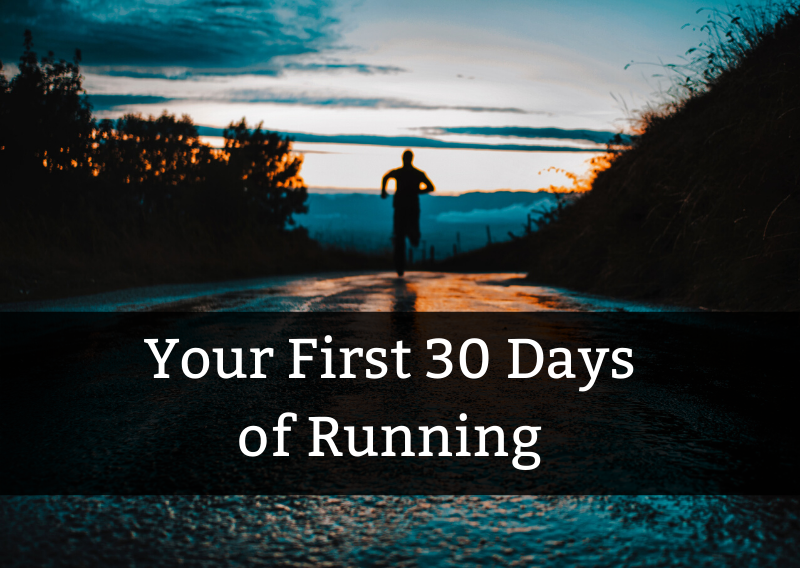
When people first start looking to get in shape, running is often the default choice.
And it’s easy to see why: Running is easily accessible to everyone (do it on a treadmill or just walk outside!), requires no special equipment, and burns a lot of calories.
But what kinds of results can you actually expect to see in your first month or 30 days of running? Will you lose weight? Get a six-pack? Develop bulging calf and leg muscles?
What will your running before and after look like?
During your first month of running, expect to be really sore for most of it! You can expect to lose anywhere from 2-10 pounds or so IF you clean up your diet and eat in a caloric deficit — that’s assuming you run a few times per week.
Your endurance will skyrocket and, though you’ll feel exhausted at first, eventually your better conditioning will likely lead to increased energy and a better mood most of the time.
I spoke with a handful of marathoners, runners, and personal trainers about what you should expect if you commit to regular running workouts for 30 days.
Weight Loss
The exact number of calories you’ll burn running is simple, but also not.
In general, you should burn about 100 calories per mile that you run. Walking burns a bit less, and people with more bodyweight can burn more due to the work they have to do to cover the same distance.
So is running around 3 miles, 3 times per week, enough to lose weight?
All experienced runners and personal trainers will tell you — burning calories means nothing if you’re not backing it up with solid nutrition.
“Any cardiovascular exercise is a great way to burn calories, but there is no afterburn effect as there is in weight lifting, and the amount of calories you burn depends greatly on exertion level and time,” writes trainer Alysa Boan.
“If paired with a calorie deficit you could expect to lose anywhere from 2-8lbs (you first month).”
(A calorie deficit means you’re consuming less food energy than you’re burning on a daily basis.)
“Weight loss is not a guarantee unless they change their eating habits,” adds trainer and instructor Pam Sherman. “I’ve seen too many runners gain weight as they start to eat more food!”
She brings up an important point — it’s important to fuel your workouts but not overeat and create a surplus of calories.
Weight loss and proper nutrition is a far bigger topic than we can cover here, but it’d be wise to eat mostly clean, nutrient-rich foods (whole grains, fruits, vegetables) and lots of protein your first month of running to ensure the best results.
Soreness
Chances are, when you first start running or jogging, you’re going to be quite sore.
Most workouts are like that. But running can lead to some serious stiffness early on due to its high-impact nature.
“Running is hard to enjoy right at the beginning. I’d feel safe saying that someone new to the sport will find the first few runs or even the first few weeks to be a challenge. Muscles will ache, feet may get blisters, knees may hurt…” writes Paul Ronto of RunRepeat.com.
But don’t worry, the aches and pains and sore legs won’t last forever.
“As you get more comfortable with running often all this will begin to disappear,” he says.
“Running is like any other sport and takes considerable practice to get good at it. Technique is important in running, and it takes a lot longer to master than most assume.”
And he’s right.
Everyone knows how to run, but few people can do it efficiently in a way that minimizes injury and soreness while maximizing performance.
Study proper running form and consider filming yourself running to identify your own form breakdowns.
Endurance

Alright, we’ve finally arrived at one of the primary benefits of running.
You may or may not lose weight depending on how you eat, but your conditioning and endurance should improve dramatically in your first month of running or jogging.
“By the end of 30 days, people should definitely feel more energetic,” writes Kim Brown, a veteran marathoner and writer for CondoControlCentral.com. “They may go from being able to run 5 minutes at a time to running 15 or 20 minutes without needing to stop.”
As you get better at the sport and movement, you’ll start to enjoy your runs a lot more — going for longer and longer as you improve.
“As you start to build the muscles non-runners don’t use you’ll start to feel stronger, less sore, your endurance will go up, and running will begin to be less painful and more enjoyable,” adds Paul Ronto.
“That ‘runner’s high’ people talk about is not something to expect right off the bat. Things like being out of breath and everything hurting will occupy your mind before there’s any euphoric sensation, but it will come! Stick with it.”
Endurance and conditioning is the area you’ll see the most improvement in 30 days.
If you’ve ever heard of “noob gains” or “newbie gains” in the weight room (meaning total beginners can get stronger extremely quickly), many new runners report the same thing.
Expect to shave time or add distance almost every single run when you’re first starting out.
(Sadly, this lightning-speed progress won’t necessarily last forever.)
Muscle & Strength
Running can certainly add muscle to your legs, especially if you incorporate high-intensity work like sprints.
(Don’t expect it to do much for your upper body.)
However, it’s unlikely you’ll see major visual differences in your legs from 1 month of running.
For better conditioning, energy, mood, and overall health — running is a great choice.
But if you’re interested in developing an athletic physique and adding muscle to your frame, or just developing better general strength, you’ll want to incorporate some specific strength work into your routine.
(And no, if you lift, running won’t kill your gains.)
Mind & Mood
Your own running before and after transformation will be much more than a physical one.
While your body may feel beat up when you first start jogging, your brain will absolutely love every second of it.
You’ll be proud of yourself for your commitment and progress, for sure, but the regular exercise can and likely will do wonders for your:
- mood
- energy
- focus
- sleep
- and more
“Exercising on a regular basis can improve mood and energy levels, decrease stress/anxiety and sugar cravings/crashes, as well as improve sleep quality and mental focus throughout the day. In the first 30 days, these changes will most likely be drastic so be sure to watch for them and use it as motivation to continue your routine,” writes trainer Boan.
Your mileage may vary, however. You might need to really push through those first couple of weeks or workouts to get the benefits.
“If you change nothing in your life, and just start running 4 days a week, you’ll eventually feel like you are low on energy. Your body will want more calories and more rest. Replenish those calories with healthy options, and by the end of your first month, you should feel lighter, more energetic, and happier” writes Ronto.
Pam Sherman writes that although running drains a lot of physical energy from your body, it ends up giving more than it takes.
“When you do it on a regular basis it provides all day energy and boost in mood as well.”
Wrapping Up
Seeing and feeling result after you start working out is one of the best ways to stay motivated.
But it’s important to have realistic expectations and goals.
If you start running a few times per week, today, after 30 days you’ll likely have dramatically improved endurance and conditioning, and you may begin to experience better sleep, happier moods, and more overall energy.
You’ll probably have to fight your way through some soreness and tough workouts, first, however!
What did I miss? What do you remember about your first month of jogging or running, if you’re experienced?
And before you go, check out how much progress you could make after one month of yoga.